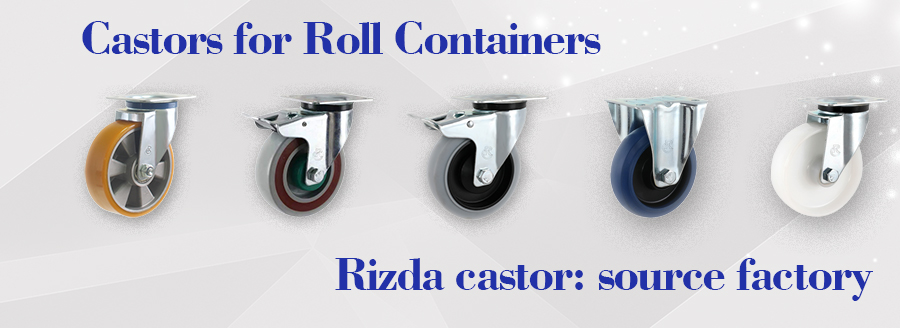When it comes to streamlining logistics and material handling, roll container castors play a pivotal role. These small but essential components enhance the mobility, efficiency, and durability of roll containers, making them indispensable in various industries such as retail, warehousing, and manufacturing. Selecting the right castors can significantly impact operational efficiency, safety, and cost-effectiveness.
In this comprehensive guide, we delve into everything you need to know about roll container castors to ensure optimal performance and reliability.
What Are Roll Container Castors?
Roll container castors are specialized wheels designed to be mounted on roll containers. These containers are widely used for transporting goods, especially in logistics and distribution. The castors attached to these containers ensure smooth movement, even when loaded with heavy goods.
Typically, roll container castors are made of durable materials such as polyurethane, rubber, or nylon, which can withstand the rigors of daily use. They are available in various sizes, weight capacities, and designs to cater to specific industrial needs.

Key Features to Consider When Choosing Roll Container Castors
1. Load Capacity
The load capacity of a castor is one of the most critical factors to consider. Each castor is designed to support a specific weight. Selecting a castor with a higher weight tolerance ensures stability and reduces the risk of wear and tear.
2. Material Composition
Different materials are suited for different environments:
- Polyurethane castors: Known for their resilience and quiet operation, ideal for indoor use.
- Rubber castors: Provide excellent shock absorption, making them suitable for uneven surfaces.
- Nylon castors: Durable and heat-resistant, perfect for industrial settings with heavy loads.
3. Wheel Diameter
A larger wheel diameter facilitates smoother movement, especially on rough surfaces. Ensure the wheel size is compatible with your operational needs for effortless maneuverability.
4. Braking Mechanism
For added safety, many roll container castors come with integrated braking systems. These brakes prevent unwanted movement, especially when the container is stationary on slopes or inclines.
5. Swivel and Fixed Options
- Swivel castors provide enhanced maneuverability, allowing the container to rotate effortlessly.
- Fixed castors offer straight-line stability.
A combination of both types is often used for optimal control.
Applications of Roll Container Castors
Roll container castors are used in a wide range of industries, including:
1. Retail and Supermarkets
Efficient movement of goods from storerooms to shelves is critical. Castors enable employees to transport inventory effortlessly, improving workflow and reducing manual effort.
2. Warehousing and Logistics
Warehouses rely heavily on roll containers for order fulfillment. Durable castors ensure seamless navigation of heavy goods through aisles, ramps, and loading docks.
3. Manufacturing
In production facilities, castors support the transport of raw materials and finished products, increasing operational efficiency.
4. Healthcare
Hospitals and medical facilities utilize roll containers with castors for the safe and efficient transfer of medical supplies and equipment.
Benefits of High-Quality Roll Container Castors
Investing in premium-quality roll container castors offers several advantages:
- Enhanced Durability: Quality materials extend the lifespan of castors, reducing replacement costs.
- Improved Safety: Braking mechanisms and sturdy construction minimize the risk of accidents.
- Noise Reduction: Smooth and quiet operation is essential in environments like hospitals or retail stores.
- Cost Efficiency: Durable castors decrease maintenance costs and downtime, ensuring uninterrupted operations.
Maintenance Tips for Long-Lasting Castors
Proper maintenance can significantly extend the life of roll container castors. Follow these tips to ensure optimal performance:
- Regular Cleaning: Remove debris and dirt to prevent obstructions.
- Lubrication: Apply appropriate lubricants to reduce friction and ensure smooth movement.
- Inspection: Check for signs of wear, cracks, or loosened components. Replace damaged parts promptly.
- Load Management: Avoid exceeding the maximum load capacity to prevent strain on the castors.
Top Manufacturers and Suppliers of Roll Container Castors
The global market offers numerous manufacturers specializing in roll container castors. Look for companies with a proven track record of delivering high-quality products. Trusted brands often provide detailed specifications, warranties, and after-sales support, ensuring peace of mind.
How to Select the Right Roll Container Castor for Your Needs
Step 1: Assess Your Requirements
Understand the weight of the goods, the type of surface, and the frequency of use.
Step 2: Choose the Right Material
Match the castor material to your operational environment for maximum efficiency.
Step 3: Verify Quality Standards
Ensure the castors meet ISO quality certifications for reliability and safety.
Step 4: Seek Expert Advice
Consult with suppliers or industry experts to choose castors tailored to your specific needs.
Conclusion
Roll container castors are a small but significant component that can greatly influence the efficiency of your operations. By choosing the right castors, maintaining them properly, and understanding their features, you can enhance productivity, ensure safety, and reduce costs.
Post time: Dec-10-2024





